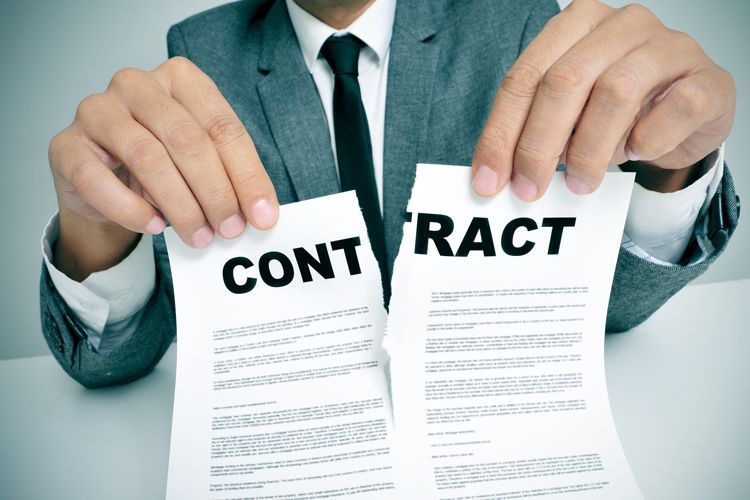The Infuriating Process Of Canceling A Cell Phone Contract After Someone Dies
Sprint, T-Mobile, and EE (formerly Orange) were all called out for giving people trouble canceling contracts after a death.

The last thing you want to worry about after a death is canceling the deceased’s cell phone contract. It should just be a simple task on the side, dwarfed by all other considerations you have to make. But a number of stories across the internet prove this isn’t always case.
Ashes To Ashes
Maria Raybould was forced to take her husband’s ashes, death certificate, and funeral bills to her local T-Mobile store to get them to cancel her husband’s contract. Even with all that proof, it wasn’t over. She kept getting texts asking her husband to purchase additional services and letters from debt collectors. She told The Telegraph “it had been easier to bury her late husband than to get his phone contract terminated.”
Orange You Glad? Not Really.
UK cell phone provider Orange (now owned by EE) refused to cancel the contract of a 14-year-old. The boy had committed suicide and his father was told to sell his son’s phone to pay the cancellation fee. EE also told a widower after his wife passed away that he would have to pay a cancellation fee to end the contract.
A Bad Time To Upsell
When a Sprint customer’s father in-law died he was told he’d have to pay a $100 early termination fee. To waive the fee he was told to produce a death certificate, which he thought was unnecessary. After a 10-day ordeal, which “included many pitches for new products and a comically long chat session with a Sprint rep,” he finally closed the account.
Are Cell Phone Companies Completely To Blame?
These stories are quite infuriating, but there’s a reason companies make it difficult to close contract-based accounts. Part of it, obviously, is money. The whole purpose of contracts is to lock customers into a multi-year rate and penalize them if they want to cancel.
The other part is actually a customer benefit: security. These companies have millions of customers, making it almost impossible for them to be personally involved in each specific case, hence strict (and often uncaring) policies. Some people might lie to get out of their contract early without incurring a penalty, but then there are scammers, ID thieves, and stalkers, who would love to breach their system. What better way than to call in with basic account information, hope for a sympathetic customer service rep, and tell them someone died?
Imagine how outraged a customer would be if any company immediately handed over their personal information, or canceled their account, without proper verification? It’s the point we made when Apple refused to unlock an iPad after a grandmother had died.
Compassionate Customer Service? Not So Fast.

This doesn’t let big companies completely off the hook. It’s clear most customer service departments could use compassion counseling when dealing with a grieving customer, but what’s the incentive? Their job is to make money for the company, and deceased customers aren’t a profit center. However, with the rise of social media, negative stories like the ones we mentioned above do make an impact on the bottom line.
Perhaps this will get phone companies to learn how to deal with death in a more humane manner. Until that glorious day, here's a list of the top four cell phone providers and the information you'll need to close an account after a death.
AT&T
Basic info on closing a AT&T account when someone dies
- Early termination and/or Transfer of Billing Responsibility fees won't be charged on the user's line of service.
- Installment plans will be adjusted for all lines of service if the account holder is deceased, or for the individual wireless line if the deceased is a wireless user on the account.
- The balance on the account is the responsibility of the estate.
- The account can't remain active under the name and Social Security number of the deceased person, with the exception of customers living in Oklahoma. A Transfer of Billing Responsibility is required to keep the wireless number with AT&T service.
To cancel or change an account for a deceased family member, call (800) 331-0500 or 611 from your AT&T wireless phone. You'll need to provide the account holder's Social Security number and/or the Security Passcode on the wireless account.
Official AT&T page here | How to close a AT&T account when someone dies
Sprint
Basic info on closing a Sprint account when someone dies
- Account holder's name (the person who established the account)
- Mobile phone number of the deceased individual
- Date of death
- Last 4 digits of the deceased customer's Social Security number
- Your name and phone number (in case Sprint needs to contact you)
- A death certificate, obituary, funeral card, probate letter, or a legal document from an attorney or a court
Official Sprint page here | How to close a Sprint account when someone dies
T-Mobile
Basic info on closing a T-Mobile account when someone dies
- Name of the person on the account
- Their mobile phone number
- Date of death
- Last 4 digits of the deceased customer's Social Security number
Official T-Mobile page here | How to close a T-Mobile account when someone dies
Verizon
Basic info on closing a Verizon account when someone dies
There’s no way to cancel wireless services online. You have to call a customer support representative at 800-922-0204.
How to close a Verizon account when someone dies
For Other Accounts...
If you’re interested in closing other online accounts or services, check out this massive list, which offers guides for almost every service we could locate. If we missed any, let us know here. Plus, if you have any personal stories (happy or sad) about canceling an account please you’d like to share please get in touch. We’d love to hear from you.
- Task: Get Your Passwords OrganizedThe typical person has an average of over 200 different online accounts,...Read more
- Digital Cheat Sheet: How To Create A Digital...What happens to your digital property after you die? Great question! Here's...Read more
- Task: Grant Access To Your DevicesIn case of an emergency, how could someone you trust access your phone?Read more
- Task: Clean Up Your Phone ContactsWe’re all familiar with naming an emergency contact if something happens,...Read more



